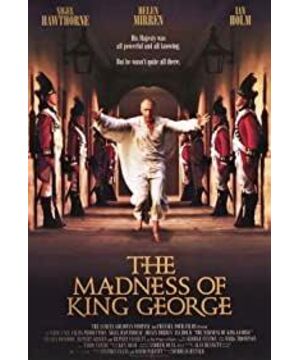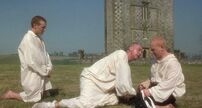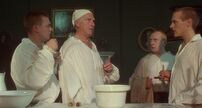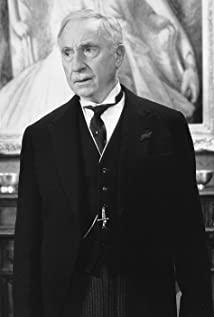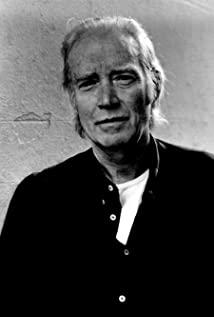Shakespeare has a saying: the head with the crown always sleeps restlessly. If there is not only a crown on the head, but also the name of "stuttering", it is enough to be beaten by Yali. But madmen are different. But seeing the red-faced king sometimes chattering, sometimes turning into a strange uncle to pounce on the nearby Gong E, and sometimes yelling and scolding with the decibels of killing pigs, it is indeed a shameless. Those who may feel embarrassed and embarrassed are only the Queen's courtiers around him, and he himself does not know it at all. In the face of the state that the master of a country cannot take care of himself, of course, the old drama of the internal affairs of the palace continues to be staged. In the meantime, there are famous imperial doctors who recite Latin and hold yellow and white objects as the basis for diagnosis, as if they have traveled into Moliere's comedy.
The most important line in the whole play comes from the mouth of the Jianghu doctor played by Ian Holm: the difference between monarchy and madness is actually only one step. Why this doctor is so liberal, I'm afraid I can't get to the bottom of it. But if you think about the safety of a country, it depends on one person, whether the country or the king is a design with great risks. Moreover, the longevity of this person's life is in an environment "out of touch with society", and the probability of suffering from claustrophobia is much higher than that of ordinary people. Today, historians who know a little about Freud use the "environmental repression theory" to explain the actions of the tyrants and tyrants of the past dynasties as psychological obstacles, which is human enough for the emperor, and for those who have been tormented by them. Citizens have lost their kindness. For example, in the film, George brought his ministers to a play when he was healthy. If there was no Wang Ling, even pregnant women, gout, and lame would not be allowed to sit down. Although according to the standards of a certain country, this cannot even reach the heel of a tyrant, but it already makes people feel that the prince is eager to usurp the throne, not only because of his ambition, but also because of his own heart (who does not answer each other). Fortunately, the United Kingdom was already a constitutional monarchy at that time, and the parliament could also intervene in the "indecent" matters of the emperor and exercise the power to dismiss or treat. In another country, under the same circumstances, it is often necessary to pay the price of countless people who were beheaded for no reason, a number of loyal ministers who were dug up and skinned, and a number of servants who were sawed and fried with a knife. Come on, kill him, and then find someone else to start over, and even the minimum medical services are exempted. Ironically, this liberal doctor's thinking is very avant-garde, but the treatment plan he came up with is in the same style as the "Top Ten Tortures in the Manchu Qing Dynasty". This is in line with Foucault's research: no matter ancient or modern, no one speaks civilized manners to lunatics anyway. Even if it is burned and flooded, it is for your own good. This principle actually applies to anything that is out of the norm and doesn't align with the "right answer." So it's a shame that the king of a country can't run away even if he calls God to save me now.
The script set the conflict tension in the interaction between the royal infighting and the parliamentary party struggle, and got a lot of high scores. It also gave enough shots to the two handsome guys who played the prince and "Little Pete". The historical fact is that after George went mad, the prince's rule was still realized. And there are two times. It is said that the luck of this prince is comparable to that of today's Charles: Although George III suffered from repeated illnesses, he never abdicated, and he has been the king for fifty-nine years. When his son officially ascended the throne, he was already fifty-eight, and he was about to retire. This is another big unreasonable thing about the monarchy, and I can't complain that being a son is too anxious. In the final stage of historical legend, George is no different from Alzheimer's, and the words "why not eat minced meat" may also be often said. Such a king, at best, can only be a stamp of personal flesh. However, in the island country of the other side, no one was so eager to start the battle for "the son of the emperor". The power of the state is over, and the proposal of the parliament is discussed and arranged. It seems that in some places that do not play cards according to "traditional culture", it is not easy for a madman to want to be famous in history like Emperor Hui of Jin by relying on thunderous words and thunderous words.
At the end of the play, a detail was arranged: the servants who served on the left and right of the emperor when he fell ill were all dismissed. The reason is that little Pitt found out there were potential people who were planted by political enemies, for the sake of "the side of the Qing emperor", not for fear of all kinds of embarrassing rumors about the emperor's illness. These young men should have been lucky enough to be reincarnated in that era and place. If they were in a certain country, even if they were not murdered, most of them would be executed in secret. In the future, writing a book "Days with XX" to make a fortune is definitely not a chance to think about. Oh, by the way, I don't know why, before they enter the palace, they don't need surgery.
View more about The Madness of King George reviews


